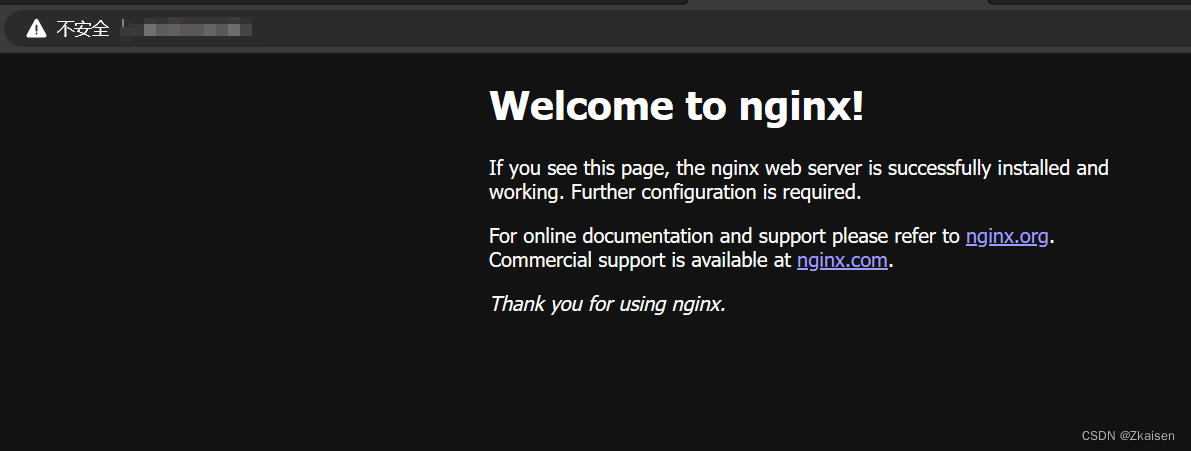Nginx_学习部署nginx
一、nginx介绍
1、nginx概念
NGINX?是用于 Web 服务、反向代理、内容缓存、负载均衡、媒体流传输等场景的开源软件。它最初是一款专为实现最高性能和稳定性而设计的 Web 服务器。除了 HTTP 服务器功能以外,NGINX 还可用作电子邮件(IMAP、POP3 和 SMTP)的代理服务器以及 HTTP、TCP 和 UDP 服务器的反向代理与负载均衡器。
2、Nginx特点
- 高并发
- 反向代理机制
3、什么是代理?
<1>正向代理:
????????正向代理概述:
流量要先经过代理服务器,代理服务器再去访问目标;服务器响应给代理服务器,代理服务器再响应给访问者;
所有流量都会经过代理服务器,一些上网行为管理,代理服务器或者做缓存都是这个目的,事实上CDN网络也是代理服务器的一种体现,如果代理服务器上有缓存,那么代理服务器就可以直接对访问者进行响应,不用再去目标服务器拿,CDN做的就是这个。
正向代理的特点:服务器端并不知道谁在访问

正常访问者要访问目标主机,直接访问就可以,但是我们不想这样,甚至访问者这边根本不能直接上网。需要经过代理服务器,流量经过代理服务器,代理服务器可以监控流量,可以通过设置一些黑名单,白名单都是可以的。
????????正向代理的功能:
- 访问原来无法访问的资源(如:翻墙)
- 可以做缓存,加速访问资源
- 对客户端访问授权,上网进行认证
- 代理可以记录用户访问记录(上网行为管理),对外隐藏用户信息
?
<2>反向代理
? ? ? ? 反向代理概述:
反向代理服务器做请求转发,跟防火墙的转发是一个概念,它并不处理业务逻辑,也不去访问数据库,也不去做运算,它只负责转发,到底转发给谁,我们可以有一个负载均衡算法,告诉它这台负载多少比例、这台负载所少比例。

?????????反向代理功能:
- 保证内网安全,阻止web攻击,大型网站,通常将反向代理作为公网访问地址,web服务器是内网
- 负载均衡,通过反向代理服务器来优化网站的负载
4、nginx下载
- 官网下载地址:nginx: download
二、nginx配置
1、windows版本 解压
<1>? 目录结构
nginx
- conf
- nginx.conf? ? ? ? ?nginx的核心配置文件
- contrib
- docs
- html? ? ? ? ? ? ? ? ? ? ? ? ? ? 网页主目录
- logs? ? ? ? ? ? ? ? ? ? ? ? ? ??
- access.log? ? ? ? ? ?访问日志
- error.log? ? ? ? ? ? ? ?错误日志
- nginx.pid
- temp
- nginx.exe? ? ? ? ? ? ? ? ? ? ? 应用程序
<2>? Windows中kill进程命令
当任务管理器中一个程序有多个进程时,如果我们想要终止这个程序,可以使用下命令如下:
taskkill /F /IM nginx.exe2、linux版本 把源码上传至服务器,需要先配置,再编译,再安装
<1>? 安装GCC编译器
yum -y install gcc pcre-devel zlib-devel openssl openssl-devel<2>? 下载nginx源码
mkdir -p /opt/nginx
cd /opt/nginx
wget http://nginx.org/download/nginx-1.24.0.tar.gz #下载nginx-1.24.0.tar.gz的源代码文件:
tar -zxvf nginx-1.24.0.tar.gz
cd nginx-1.24.0/
<3>? 配置
./configure --prefix=/usr/local/nginx --with-http_ssl_module
./configure --help
# --prefix=/usr/local/nginx参数指定nginx的安装路径
# --with-http_ssl_module是安装https模块
./configure --prefix=/usr/local/nginx --with-http_ssl_module<4> 编译
编译C语言的源代码为二进制文件:make
<5>? 安装
make install查找nginx命令:
whereis nginx
find / -name nginx

nginx参数-c 用于指定配置文件,默认是conf目录下的nginx.conf

?<6>? 启动nginx
cd /usr/local/nginx/sbin
./nginx # 启动
ps -ef | grep nginx # 检查nginx是否启动
<7>? 浏览器访问
服务器的80端口,如果看到Welcome说明安装成功

可以尝试修改一下/usr/local/nginx/html/index.html的源文件,看看是否能够看到修改成功后的页面
<8>? nginx.conf 配置文件说明
[root@VM-24-9-centos conf]# vim nginx.conf
#user nobody;
worker_processes 1; #工作进程
#nginx的错误日志
#error_log logs/error.log;
#error_log logs/error.log notice;
#error_log logs/error.log info;
#注释状态表示保持默认情况。默认就是logs/nginx.pid文件,nginx.pid是启动nginx的一个进程文件
#pid logs/nginx.pid;
#后边有并发操作再来测试它
events {
worker_connections 1024; #工作并发连接数,跟我们同时处理的并发量和服务器系统的利用率有关
}
#http节点是配置http的
http {
include mime.types; #包含http协议中的文件类型,保持默认
default_type application/octet-stream;
#log_format日志文件的格式:remote_addr远程IP地址、remmote_user远程用户(默认是空的)
#[$time_local]代表本地服务器的时间,"$request请求的类型
#log_format main '$remote_addr - $remote_user [$time_local] "$request" '
# '$status $body_bytes_sent "$http_referer" '
# '"$http_user_agent" "$http_x_forwarded_for"';
#access_log logs/access.log main;
sendfile on; #可以发送文件
#tcp_nopush on;
#keepalive_timeout 0;
keepalive_timeout 65; #长连接的超时时间,默认
#gzip on; #传输过程是否支持针对文本文件进行压缩
server {
listen 80; #监听80端口
server_name localhost;
#charset koi8-r; #字符集
#access_log logs/host.access.log main;
#location 这里"/"代表html的根目录
location / {
root html; #就是apache里面指定的documentroot参数
index index.html index.htm; #指定的默认首页
}
#error_page 404 /404.html; #服务器出错跳转的404页面
# redirect server error pages to the static page /50x.html
#
error_page 500 502 503 504 /50x.html; #服务器出错后跳转的50x页面
location = /50x.html {
root html;
}
# proxy the PHP scripts to Apache listening on 127.0.0.1:80
#
#location ~ \.php$ {
# proxy_pass http://127.0.0.1;
#}
# pass the PHP scripts to FastCGI server listening on 127.0.0.1:9000
#
#location ~ \.php$ {
# root html;
# fastcgi_pass 127.0.0.1:9000;
# fastcgi_index index.php;
# fastcgi_param SCRIPT_FILENAME /scripts$fastcgi_script_name;
# include fastcgi_params;
#}
# deny access to .htaccess files, if Apache's document root
# concurs with nginx's one
#
#location ~ /\.ht {
# deny all;
#}
}
# another virtual host using mix of IP-, name-, and port-based configuration
#
#server {
# listen 8000;
# listen somename:8080;
# server_name somename alias another.alias;
# location / {
# root html;
# index index.html index.htm;
# }
#}
# HTTPS server
#
#server {
# listen 443 ssl;
# server_name localhost;
# ssl_certificate cert.pem;
# ssl_certificate_key cert.key;
# ssl_session_cache shared:SSL:1m;
# ssl_session_timeout 5m;
# ssl_ciphers HIGH:!aNULL:!MD5;
# ssl_prefer_server_ciphers on;
# location / {
# root html;
# index index.html index.htm;
# }
#}
}
本文来自互联网用户投稿,该文观点仅代表作者本人,不代表本站立场。本站仅提供信息存储空间服务,不拥有所有权,不承担相关法律责任。 如若内容造成侵权/违法违规/事实不符,请联系我的编程经验分享网邮箱:chenni525@qq.com进行投诉反馈,一经查实,立即删除!